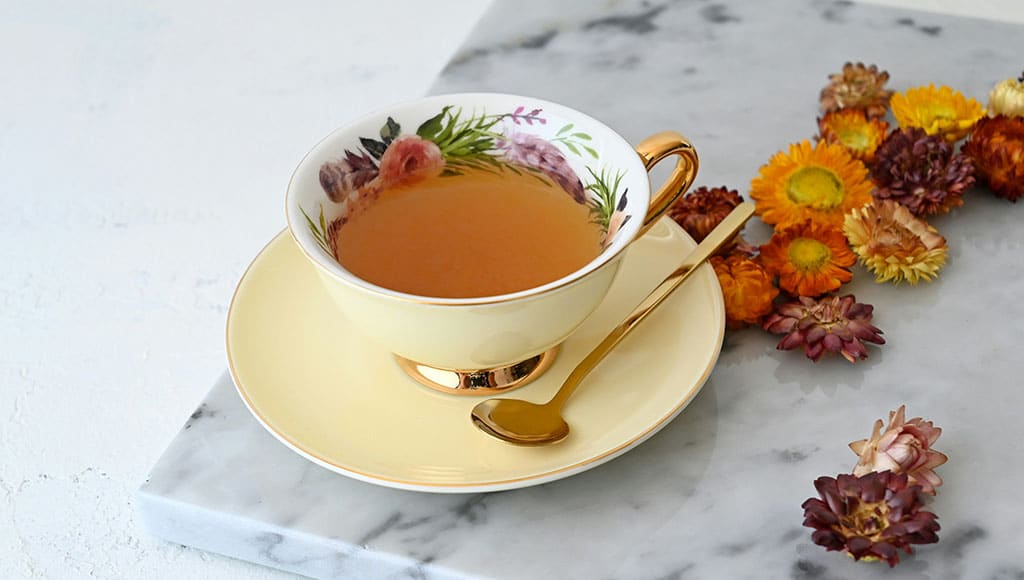Born and raised in England, it’s perhaps no surprise that I have a life-long affection for tea. It’s a habit that has made the transition to Portuguese life with me, despite the initial shock of weak local teabags and the prevalence of what Americans call ‘shelf’ milk, or to me, UHT.
I’d say my palate has almost completely adjusted now, and a mug of ‘British Rail’ or ‘builders’ tea’ remains an important part of my morning routine, and subsequent pick-me-up throughout the day, just like now – as I sit, focus and put digital pen to paper for you here.
What I am sipping on now, as I write, is, of course, very much a part of British culture. And within the realms of Anglo-Portuguese relations is a return to the ‘scene of the crime’. For it’s Portugal that the Brits can thank for their tea habit, specifically Portuguese consort, Catarina of Braganza, who would marry English King Charles II.
I say ‘crime scene’ because the milk-bearing, dark brew that I enjoy is, I suspect, a far cry from the fine leaves that Catarina would have taken to Blighty, as part of her dowry deal, no doubt taken then without milk, or refined sugar, and in a fancy cup, not a vulgar branded mug, like me.
The scene I have in my mind’s eye, as I ponder her arrival, is of the betrothed beauty entering the English Royal Court, in 1662, and being offered beer or gin to celebrate her arrival and future prospects. She, of course, eschews the somewhat stereotypical and alcoholic advances of her husband-to-be and his courtiers, suggesting instead that they all have a ‘nice cup of tea’, which ultimately becomes a national obsession, so “muito obrigado, Portugal!”.
Though by most accounts her time in England and with husband Charles was not the easiest or happiest of royal lives, she’s thought to have brought with her the gift of tea, marmalade and tobacco too, albeit not a royal heir, perhaps the most important part of her marital mission. In addition to these now everyday indulgences, synonymous with British life, she also came with much-needed wealth for her poverty-stricken king and the right to free trade with all the Portuguese territories, notably including India. Clearly, we Brits have a lot to thank her for.

Incidentally, the Portuguese, along with fellow Dutch explorers, are thought to be responsible for introducing tea not just to the English but to the entire Western world. Thanks to their early trade links with China, specifically Macao, which was gifted to them by the Emperor of China in the mid-1500s, Portugal was able to expand its global territory and influence, including the importation and enjoyment of tea, known as ‘chá’ in Portugal, for those who might unusually prefer it to the national beverage of choice, coffee.
Whilst Brits use ‘cha’ colloquially too, as in “who fancies a nice cup of cha?”, when referring to their much-loved Portuguese gift, myth and legend has it that the word ‘tea’ comes from the abbreviation T.E.A. Standing for ‘transporte de ervas aromáticas’ (Aromatic Herbs in Transport), this early and accidental branding would have presumably been seen on tea chests, aboard ships and in docks where the fragrant and various leaves would be making their way to refresh and delight European taste buds.
I trust by now you get a sense of Portugal’s importance when it comes to the popularity of tea in Europe, and the western nations late to the worldwide tea-drinking party. Furthermore, you might appreciate the historical rhyme that sees this columnist declaring his love and attachment to tea, almost weaned on it in the UK and now quaffing it happily and continuously in Queen Catherine’s native land. What you might not discern from the word picture drawn so far is my unease at indulging in the said habit in such a barbaric and philistine way.
Back to my mind’s eye, and this time I am visualising tea exporters in the Far East (those whose forefathers may have shaken the hands and emptied the purses of Portuguese traders centuries ago) preparing tea for the British market, and by that, I mean sweeping the floor of tea leaf dust, after every other nation has had its more discerning pick. This unholy, black dust then industrially stitched into a bleached paper sachet that will be later damaged by boiling water, and only to be improved by the addition of milk and sweetener.
Imagine then my delight, and accompanying sense of salvation, at the discovery of Portuguese tea purveyors, Infusões com História, who here in the land of confirmed coffee shot drinkers and expat Brit tea abusers, are honouring – profoundly – Portugal’s esoteric tea-loving history. And when I say teas, they say ‘infusions’, which gives us a clue as to this firm’s attention to detail and dedication to the task.
A very far cry from chucking a bulk-bought tea bag into your old, chipped mug, as your watched kettle fails to boil fast enough, you’ll find (literally translated) ‘Infusions with Stories’ at the other end of the tea-drinking spectrum. This is meditative and mindful mashing (the northern Brit term for tea brewing). They are purists and evangelists when it comes to honouring the leaves that can bring so much pleasure but are so often dishonoured in the comfort and caffeine-seeking rush of modern life.
“Starting from unforgettable sensory experiences, we recover the history and heritage of our territories,” say ICH, whose infusion alchemists you’ll find “among mountains and valleys, through a dance that combines aromas with emotions, feelings with pleasures, sensations that last on this biological, magical, incredible, special journey.”

Sounds good, right? And I am so IN on this journey they speak of that can take us into the exquisiteness and subtlety of tea, beyond the more brutal reviving capabilities that the British have settled upon, with the mainly black, breakfasty leaves that they favour all day long.
Your and my guides on this special journey are Miguel Moreira and Valdemar Sousa, who, since 2017, have wanted to “preserve the Portuguese legacy based on autochthonous products, tracing two different routes through the north of Portugal: the Romanesque and Douro regions”.
The pair have certainly found support for this mission, where over the last four years their ‘sense-awakening’ company’s sales have increased thirty-fold, within the fine-dining niche, all over the world. They trade on the foundation of “green Portuguese heritage”, as well as the keywords of ‘exclusivity’, ‘Portugality’ (a new, but pleasing term, for me), ‘natural’, ‘organic’ and ‘kosher’.
Sat with Miguel in a fascinating tea-tasting conversation recently, I savoured, for example, a painstakingly-blended and conscientiously-brewed blend of four herbal elements, three of which are grown organically in northern Portugal, and the other imported from Egypt. Glowing in a wine glass, this concoction was complex, refreshing and feels health-enhancing too, as I dare say is their whole range, which calls on a combination of 60 international, aromatic components, four of them proudly Portuguese.
Sustainability and fair trade are also “fundamental pillars in all production”, for Infusões com História who, in 2020 and 2021, won seven awards in the international competition Les Thés du Monde, in Paris.
Pondering all of this care and attention to tea-producing detail, as I sip and learn with Senhor Moreira, I can understand why back in the 17th century, the then Queen Mother in England wrote of Catarina that she was “the best creature in the world … she is a saint!”
And as I raise my mug here, I agree and humbly add: “Thank you for your gift of tea, m’lady!”
See and taste for yourself at www.infusoescomhistoria.pt
Carl Munson is host of the Good Morning Portugal! show every weekday on YouTube and creator of www.learnaboutportugal.com, where you can learn something new about Portugal every day!
















